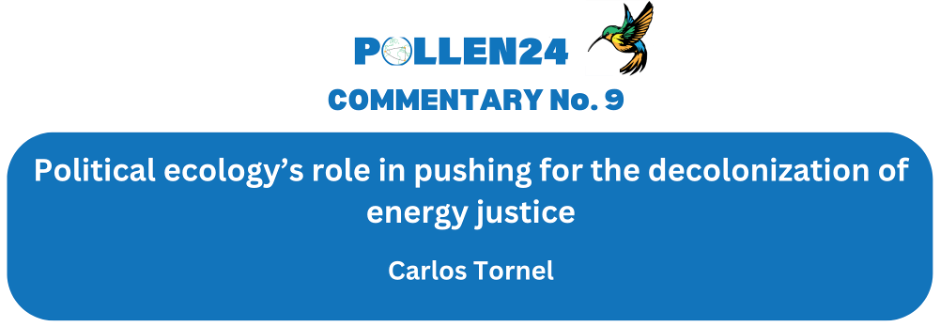2024-05-08
Political ecology’s role in pushing for the decolonization of energy justice

Abstract
Political ecology’s role in pushing for the decolonization of energy justice
Political ecology has significantly shaped the discourse surrounding energy systems, infrastructure, and their transition away from fossil fuels. While political ecology had some unpromising beginnings in the field of energy, as it was usually presented as ‘just another resource’, the understanding of energy as a relational-metabolic concept has come a long way (Cederlof, 2021). Concurrently, energy justice (EJ) has garnered considerable attention over the past decade, evidenced by a proliferation of scholarly articles. However, much of this literature remains entrenched within a Western-modern framework, predominantly emphasizing the principles of environmental justice: distribution, recognition, and procedural fairness with some advocating for a cosmopolitan or a restorative approach (Heffron, 2022). The prevailing majority overlooks the profound influence of colonialism-coloniality, capitalist modernity, and patriarchy on the formulation of energy as a concept and its infrastructural character. Political ecology is well placed to address these problems within EJ.
Knuth and colleagues (2022) have offered an insightful reflection of political ecology's role in the ‘energy transition,’ not only by acknowledging the costs and trade-offs of purportedly renewable energy but also by addressing how these 'transitions' are reshaping land-grabbing practices on the one hand, and potentially challenging existing power dynamics through the provision of tools and insights for grassroots movements on the other. While crucial, these approaches must grapple with the inherent problems within the EJ framework, necessitating attention to three specific issues. Firstly, the notion of renewability remains inadequately scrutinized in the literature. Dunlap (2020) not only revisits the concept of 'transitions' as euphemisms developed during the oil crisis of 1973 but also highlights the problematic nature of 'renewable energy', emphasizing its material dependence on fossil fuels throughout the entire value chain and its reliance on mining and extractive technologies (Dunlap, 2021). Dunlap proposes the term 'fossil fuel+' to draw attention to this issue. Similarly, Siamanta (2024) underscores the exploitative and extractive nature of 'renewable energy', advocating for a dialogue on renewability as a commons-based and peer-to-peer reformulation. Moreover, apart from its material implications, renewability is also contingent on what Dunlap (2020) termed infrastructural colonialism. Low-carbon infrastructure functions as a 'mode of conquest', employing social engineering techniques to colonize hearts, minds, and landscapes. Political ecologists must therefore directly address renewability as a significant concern in its own right.
Secondly, scholars have drawn attention to the colonial underpinnings of both energy systems and infrastructure (Batel and Devin-Wright, 2017; Boyer, 2019). While insightful, the critique of decoloniality remains somewhat superficial. Coloniality encompasses the array of practices stemming from the colonial matrix of power, knowledge, being, and gender established by colonialism, which persist within contemporary, (neo)colonial societies (Lugones, 2008). Decolonial scholars highlight colonial difference as the constitutive other (dark side) of modernity, expressing a healthy skepticism toward modern concepts such as human(ity), human rights, development, or justice, which tend to erase otherness and perpetuate epistemological and ontological injustices (Maldonado Torres, 2017). Concerning energy infrastructure, systems, and transitions, the decolonial critique advocates for a rejection of the imposition of a Western-centric, universalistic formulation of justice, advocating instead for a historically contextualized, locally defined understanding of justice (Tornel, 2023). The postdevelopment and decolonial critiques of capitalist modernity can enhance political ecology's engagement with the energy field by highlighting the necessity to challenge assertions of access, sustainability, and reliability alongside issues of distribution, recognition, and participation, thus avoiding the imposition of a universal modernization agenda.
Finally, there's a pressing need to closely consider the emerging contributions of political ontology in shaping the definition of justice and the histories it tells over what energy is and what it says. As highlighted by Blaser and Escobar (2023), political ecology has transitioned from initially engaging with the power dynamics and conceptualizations of nature, towards broader epistemological debates. A third generation of political ecology, or ontology, now emphasizes the relational nature of energy, shedding light on the imperial origins of 'energy' as a measure/equivalence of work extraction (Illich, 2009; Lohmann, 2021), while also challenging the nature/culture binary arising from the study of ecological distributive conflicts. Political ontology directs attention to the power-laden negotiations involved in bringing forth the entities constituting a particular worldview or ontology, the incommensurabilities perpetuated by modernist practices through state and legal systems, and the potential for dialogue between these worlds (i.e. a pluriverse) (Dunlap & Tornel, forthcoming). Thus, political ecology should persist in challenging the formulation of needs and the modern assumption of well-being typically associated with energy systems, infrastructures, and their transitions.
If, as Knuth and colleagues (2022: 997) argue, one of the tasks of political ecology is to contribute to ‘lead critical and engaged scholarship in support of energy/climate justice’ the promise of just and plural futures cannot assume a Western-centric and universal formulation of justice in environmental, climate of energy contexts (Álvares & Coolseat, 2020; Sultana, 2022; Tornel, 2023). Political ecology must directly confront the concept of renewability and its discursive manipulation to justify capitalist modernity, challenge the Western-centric understanding of justice, and foster an ontological dialogue or pluriverse that embodies the potential for coexisting within a world of multiple worlds. As Jaime Martínez Luna (2020) compellingly articulates, the point is neither to interpret nor change the world, but to share it.
Notes
Researcher at the Strategic National Program of Energy and Climate Change. CONAHCYT, México. tornelc@gmail.com
References
Álvares, L., and Coolseat, B. (2020). Decolonizing environmental justice studies. Capitalism Nature Socialism, 31(2), 50–69.
Batel, S., & Devine-Wright, P. (2017). Energy colonialism and the role of the global in local responses to new energy infrastructures in the UK. Antipode, 49(1), 3–22.
Blaser, M and Escobar, A. (2023). “Political Ecology.” In, J. Adamson, W. Gleason and D. Pellow (Eds.) Keywords in the Study of Environment and Culture. (pp: 164-67). New York: New York University Press.
Boyer, (2019). Energopolitics: Wind and Power in the Anthropocene. Durham: Duke University Press.
Cederloff, G. (2021). Out of steam: Energy, materiality, and political ecology. Progress in Human Geography, 45(1), 70–87
Dunlap, A. 2020. Bureaucratic Land Grabbing for Infrastructural Colonization: Renewable Energy, L’Amassada and Resistance in Southern France. Human Geography, 13(2), 109–26.
Dunlap, A. (2021). ‘Does renewable energy exist? Fossil fuel+ technologies and the search for renewable energy.’ In Batel, S. & Rudolph, D. (Eds.) A critical approach to the social acceptance of renewable energy infrastructures. (pp. 83-102). Palgrave Macmillan.
Dunlap, A & Tornel, C. (In Press). Was Postdevelopment Too Much? Autonomous Struggle, Academic Coloniality & the Radical Roots of the Pluriverse. Globalizations.
Heffron, R. (2022). Applying energy justice into the energy transition. Renewable and Sustainable Energy Reviews, 156: 111936.
Illich, I. (2009). The social construction of energy. The Harvard Gazette: 11-21.
Knuth, S., Behrsin, I., Levanda, A. & McCarthy, J. (2022). New Political ecologies of renewable energy. EPE: Nature and Space, 5(3): 997-1013.
Lohmann, L. (2021) Bioenergy, thermodynamics and inequalities. In Backhouse, M., Lehmann, R., Lorenzen, K., (Eds.) Bioeconomy and global inequalities: socio-ecological perspectives on biomass sourcing and production. (pp. 85-103) Palgrave Macmillan.
Lugones, M. (2008). The coloniality of gender. Worlds & Knowledges Otherwise: 1-17.
Maldonado Torres, N. (2017). On the Coloniality of Human Rights. Revista Crítica de Ciências Sociais, 114: 117-136.
Martínez Luna, J. (2020). Comunalidad y Vida Concreta. Pensamiento Indígena Contemporáneo y su relación con el Pensamiento Gandhiano. Universidad de la Tierra, Oaxaca.
Siamanta, 2024). Community Renewable energy ecologies: Rhizomatic renewable energy development and experimental-experiential emancipation. Human Geography, 1:15.
Sultana, F. (2022). The unbearable heaviness of climate coloniality. Political Geography, 99: 102638
Tornel, C. (2023). Decolonizing energy justice from the ground up. Political ecology, ontology and energy landscapes. Progress in Human Geography, 47(1) 43–65
